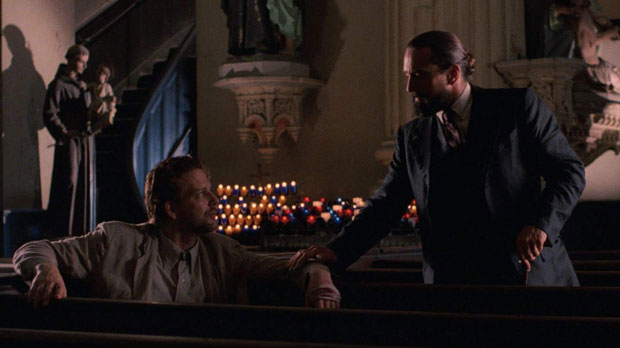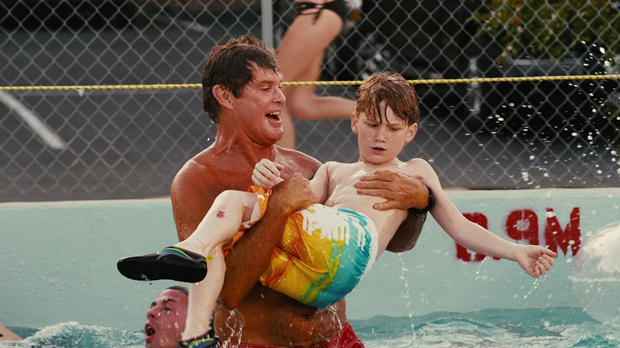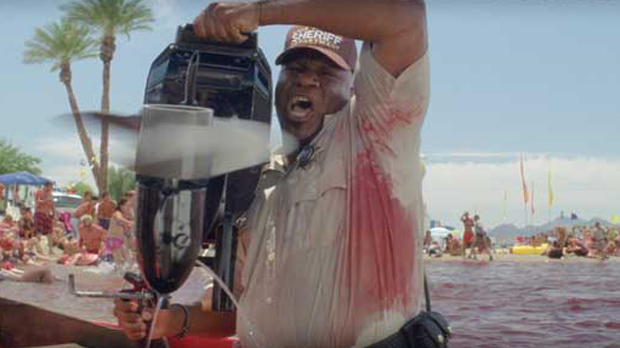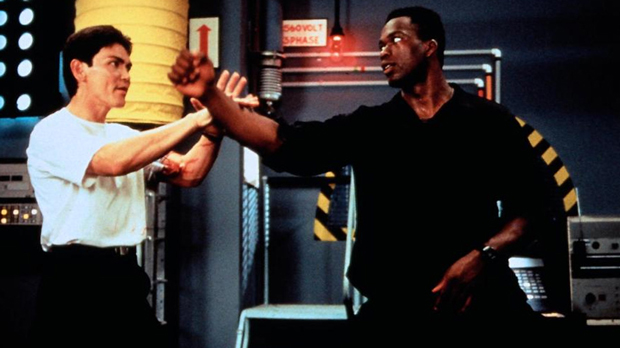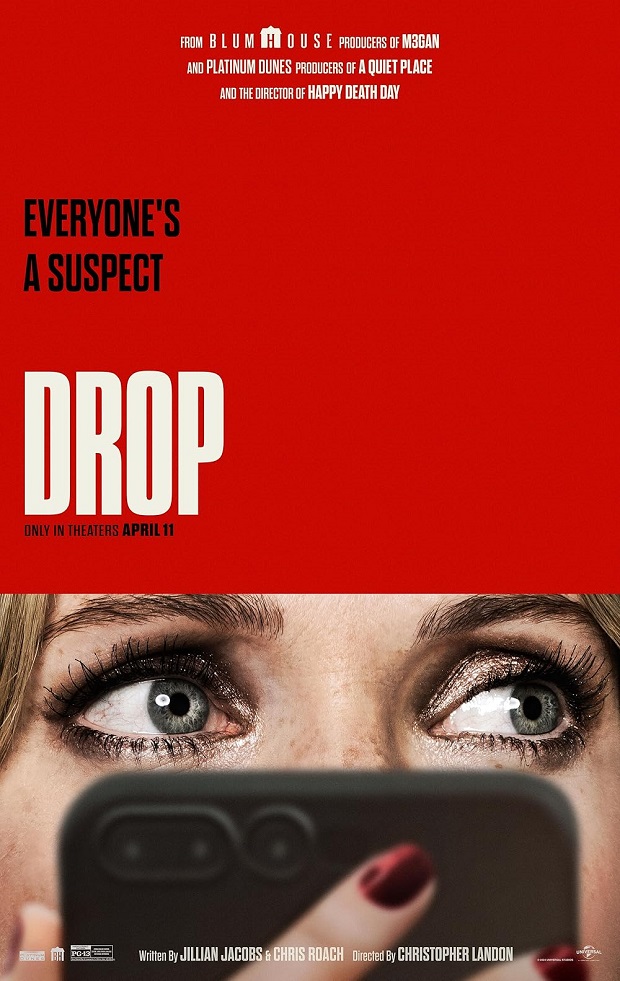 Angel Heart (1987) TriStar/Horror-Thriller RT: 113 minutes Rated R (violence, bloody images, language, drug material, nudity, a graphic sex scene) Director: Alan Parker Screenplay: Alan Parker Music: Trevor Jones Cinematography: Michael Seresin Release date: March 6, 1987 (US) Cast: Mickey Rourke, Robert De Niro, Lisa Bonet, Charlotte Rampling, Stocker Fontelieu, Brownie McGhee, Michael Higgins, Elizabeth Whitcraft, Eliott Keener, Charles Gordone, Dann Florek, Kathleen Wilhoite, Pruitt Taylor Vince. Box Office: $17.1M (US)
Angel Heart (1987) TriStar/Horror-Thriller RT: 113 minutes Rated R (violence, bloody images, language, drug material, nudity, a graphic sex scene) Director: Alan Parker Screenplay: Alan Parker Music: Trevor Jones Cinematography: Michael Seresin Release date: March 6, 1987 (US) Cast: Mickey Rourke, Robert De Niro, Lisa Bonet, Charlotte Rampling, Stocker Fontelieu, Brownie McGhee, Michael Higgins, Elizabeth Whitcraft, Eliott Keener, Charles Gordone, Dann Florek, Kathleen Wilhoite, Pruitt Taylor Vince. Box Office: $17.1M (US)
Rating: ****
What people remember most about Angel Heart is not its deft blending of two distinct genres- hard-boiled detective noir and supernatural horror- but director Alan Parker’s battle with the MPAA over the sex scene between Mickey Rourke and Lisa Bonet. They gave it the dreaded X rating which would have spelled certain death at the box office. After several unsuccessful appeals and under pressure from TriStar, Parker reluctantly trimmed ten seconds from the scene in question in order to obtain the desired R rating. I’ve since see the uncut scene and don’t understand what all the fuss was about. It’s hardly pornographic. Quite the opposite, it’s artfully done and makes sense both stylistically and contextually.
In any event, I prefer to think of Angel Heart as yet another brilliant movie from Parker whose impressive list of credits includes Midnight Express, Fame, Shoot the Moon, Pink Floyd The Wall, Birdy, Mississippi Burning and The Commitments. Adapted from the novel Falling Angel by William Hjortsberg, it plays like a nightmare in which nothing fits yet everything makes weird sense. Set in 1955, Rourke (The Pope of Greenwich Village) stars as Harry Angel, a New York City private investigator hired by a mysterious client, Louis Cyphre (De Niro, Raging Bull), to track down a missing person, a crooner known as Johnny Favorite who disappeared after coming home disfigured and traumatized from WWII. They have unfinished business of some unspecified sort.
Angel’s investigation takes him to New Orleans where he becomes immersed in a world of devil worshippers, voodoo practitioners and bizarre murders. He manages to track down Epiphany Proudfoot (Bonet, The Cosby Show), the daughter of a former lover of Favorite’s. She may or may not hold the key to solving the case.
Aside from a few minor pacing issues, Angel Heart is excellent. I was a 19YO community college student when it came out amidst all the aforementioned controversy. I didn’t care about any of that; I was already a fan of Parker’s by this point and couldn’t wait to see what he had in store for audiences with his first horror movie. I was mighty impressed with Angel Heart and how Parker perfectly merged detective noir and the occult. It reminds me of Ridley Scott’s merging of detective noir and sci-fi in Blade Runner. I also love how the story drops a few clues to what’s really happening around Angel. I know it’s been three decades since Angel Heart came out, but I still don’t like dropping spoilers. I’ll try to be careful; nonetheless, proceed with caution if you still haven’t seen it. Angel is first contacted about the case by an attorney from the firm of “Winesap & McIntosh”. Both names are types of apples. What is the Biblical significance of the apple? Check the book of Genesis. I’ll say no more.
Angel Heart is thick with atmosphere and a palpable sense of dread courtesy of cinematographer Michael Seresin, a frequent collaborator of Parker’s. The director describes it as “shooting a black and white film in color”. The desaturated, monochromatic look of the movie evokes not only fear and anxiety but also a period feel. The director himself describes it as “black and white in color”. Frequent images of fans and staircases add to its disquieting feel. Shot entirely on location in Harlem and New Orleans, it possesses a sense of gritty realism you won’t find in films shot on studio soundstages.
Sound is also an essential component of Angel Heart with voices whispering names and the cacophony of noises from religious rituals, barking dogs and other sources. The score by Trevor Jones with the single-key piano cues and saxophone laments is haunting. The 1937 song “Girl of My Dreams” acts as a motif meant to haunt viewers further. It also contains a decent helping of jazz and blues, the exact kind of music you expect to hear in New Orleans.
Rourke, an actor I really like, is perfectly cast as Harry Angel. He has this shabby, shambling quality perfectly suited to his character, an unwashed, down on his luck PI barely keeping it together as it is. As the case spirals out of control, he too begins to unravel. Bonet makes an auspicious film debut as Epiphany. It’s amazing how she went from being a Cosby kid to a sexually charged woman drawn to Angel. Their big scene together is both electric and frightening with the blood dripping from the ceiling onto their bodies as they have intense sex.
Top honors go to De Niro as Louis Cypher, a strange man with black, slicked-back hair, a black beard and pointed fingernails. He’s equal parts elegance and menace. He plays the role with style and understated panache. By not overplaying it, he enables his character to get under the viewer’s skin. Charlotte Rampling (The Night Porter) shows up as Margaret Krusemark, a New Orleans socialite who dabbles in the occult. She might have information crucial to Angel’s case.
Most of the violence in Angel Heart occurs off-screen. Parker leaves it to us to picture in our minds somebody’s heart being cut from their chest or somebody being castrated and choked by the severed organ. It’s a smart move on his part; the imagination is often scarier than what is actually shown. This is how thrillers from the 40s and 50s operated since the Production Code forbade graphic violence.
In my opinion, Parker does everything right in Angel Heart which is why it’s one of my favorite non-slasher horror movies of the 80s. I love how he finds beauty even in the darkest, ugliest places. Look at the opening scene in a dark NYC alley with the trash cans, fire escapes, half-melted snow and dripping water. Oh yeah, and the dead body with its throat slit. Although we never learn the identity of the victim, it perfectly sets the tone for the whole movie. Even though Angel Heart fills me with a sense of unease every time I watch it, it’s an awesome viewing experience. I love it!
